A Trip on Solta Island: 6 Lessons I Learned from Locals
May 24, 2021 - A TCN intern takes a trip on Solta Island without preparation, encounters unusual experiences with the locals, and learns lessons that will be helpful for anybody visiting the closest island to Split.
1. Clothes do not make the man. A port does not make the island. Don't be too quick to judge.
Rogac port where the ferry from Split comes does not impress a traveller. Like most people, I had visited the more popular island of Brac before I went to Solta. Rogac loses out to shiny Supetar, the biggest city on Brac. The port of Rogac is tiny, there is nothing to do there, no people. However, exactly here in Rogac, the first strange story happened to me in the first hour after my arrival. I found one good angle between the yachts at the marina and sat down to take an on-arrival picture. Then someone called out to me...
"Do you know what this is in front of you?" a senior man asked me.
"No, I don't," I said. "I know what is a boat, a yacht, a ship, and this vessel is somewhere between a boat and a yacht, closer to a boat, of course, but what exactly it is, I've no idea," I thought.
"Are you a journalist?"
"No, I'm just a tourist. I came here for the weekend. I'm from Russia but currently work in Split."
"What do you think about your president?"
The question put me in an awkward position. This grandpa in a baseball cap with a canister in his hand, similar to a grandpa from 'Gravity Falls', looked nice. The matter was tricky. What's his opinion? What if our minds are the opposite? I did not want to argue with him. Senior people rarely change their minds, thus even my MD in political science wouldn't help me.
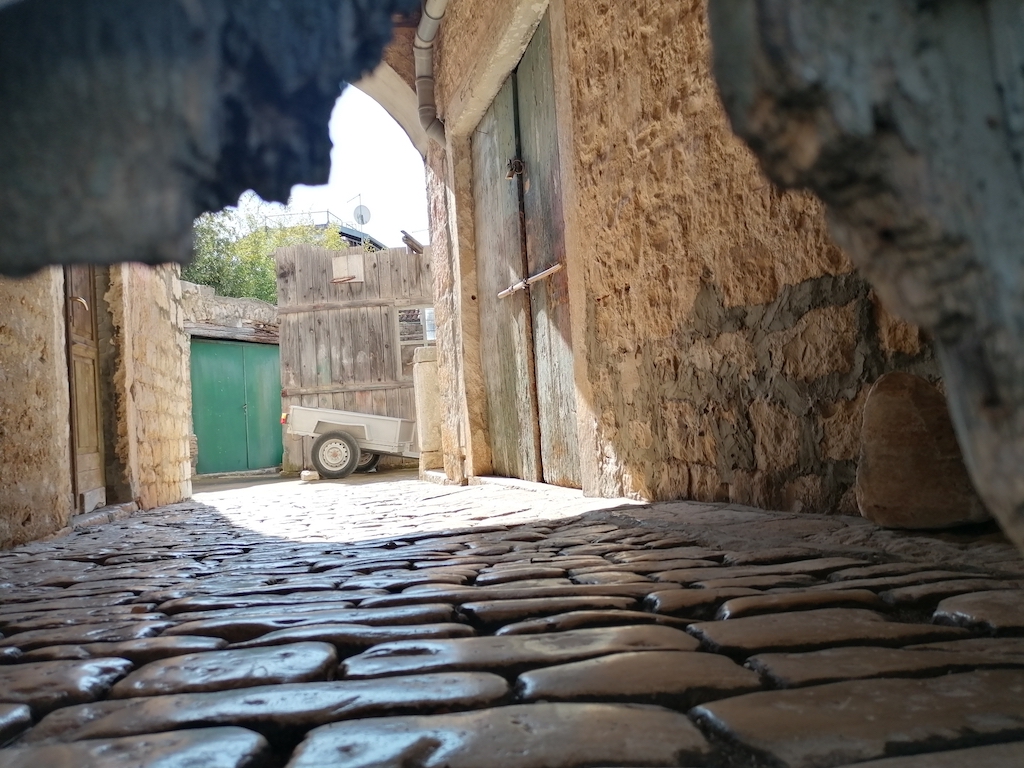
"It's hard to answer in one sentence about his 18 years of the presidency," I started to draw back the fire. Milan, that's his name, interrupted me. He told me that our president is a strong person he'd like to have as a major somewhere in Dalmatia. He said that he'd like to get vaccinated with the 'Sputnik V' vaccine. I guess that these statements should be regarded as a gesture of goodwill to me in any case.
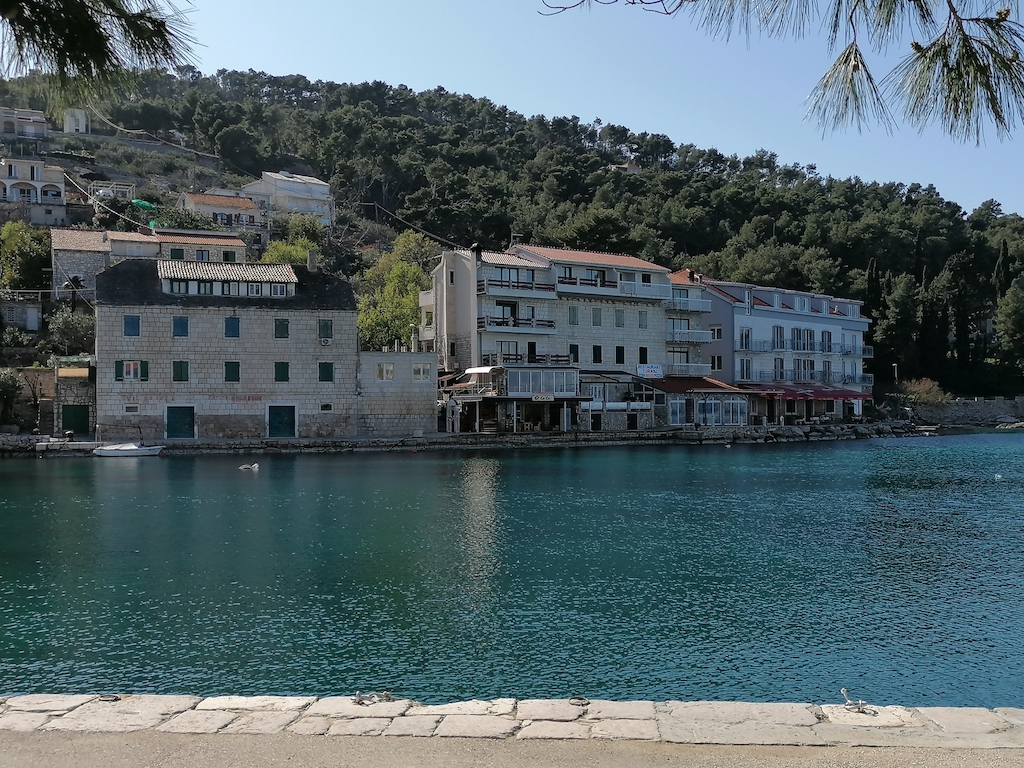
Actually, Milan knows about Russian-Croatian relations much more than the average person. He knows admiral Mate Zmayevic (born in the city of Perast, Dalmatia) who fought for Peter I in the Northern War, Alex Dundic (born in the village of Grabovac, Dalmatia) who fought for the Red Army in the Russian Civil War. He listens to Russian opera stars Elina Garancha, Anna Netrebko, Dmitry Khvorostovsky, and others. It's surprisingly pleasant for a broad-minded person far from tourist and nomad routes.
2. Take the initiative to talk to locals on the island.
Solta has wonderful nature and climate. Traditions of producing olive oil, wine, and honey here originate from ancient times. But since Solta Island is not very popular among tourists, you'll need to make more effort to get it. Even as you go to the island already prepared by informational sources, you have to be ready to ask, perhaps, to clarify something about wine tasting, olive oil tasting, or a honey farm. You go here ahead of the masses, take the initiative to start a conversation, and keep it!
I regret that I did not answer 'yes' to Milan's question of whether I was a journalist. Then I'd have more chances to guide our conversation to the topics I am interested in. Otherwise, it happened so that we were talking about themes that interest mostly a social group 70+-year-olds:
- life after death (Milan suffered two strokes and saw something on the other side);
- The Dulce Laboratory in New Mexico where human-alien hybrids were created;
- Orion correlation theory that says about the connection between the pyramids of Giza and the Orion belt;
- indigo children;
- masons, etc.
Certainly, I'd better answer that I'm a travel journalist and interested in things like what to eat, what to do, etc. So that, if somebody asks you on Solta, you can use the following answers I prepared in advance. "I'm a tourist from <...> and a wine lover."I'm a traveller and a gourmand hunting the local specialties."
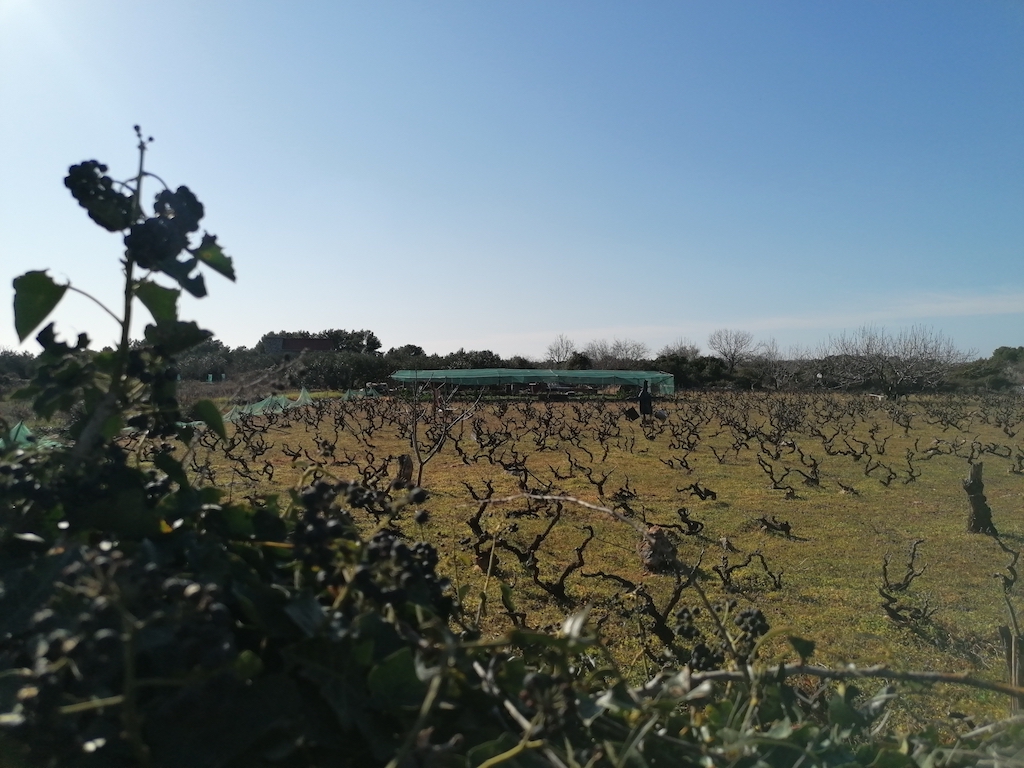
3. Don't be afraid to go around the island alone.
Saying goodbye, Milan wondered why I was here alone. "You don't have to go alone. Find yourself a husband. Not me, I'm too old for you, I'm over 72..."
I guess it was his joke about the age gap problem to marry me, because earlier he'd mentioned his wife was waiting for him at home, their three children, other common stuff.
Then he relented: "Well, all right, you can go alone. Don't be afraid. There are no poisonous snakes on the three Dalmatian islands - Solta, Lastovo, and Vis islands. But there are black widow spiders and ticks..."
As planned, I went through Grohote and Gornje Selo to Stomorska that I considered the most beautiful and lively town on the island. Besides, I was caught up in wanting to check a remark of my Croatian colleague that Stomorska on Solta looks similar to Povlja on Brac. He said it to me once I just got back from Brac. He really encouraged me, thus I'm not going to share if it looks similar or not. Go and check it by yourself!
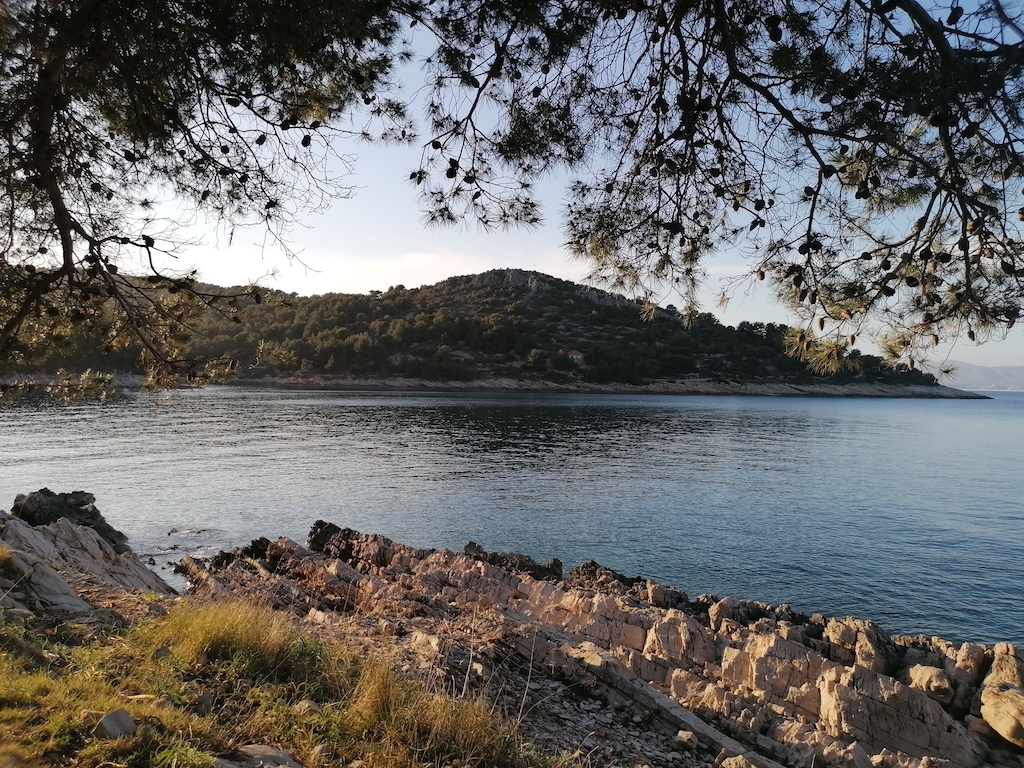
I went through almost all the island - from Rogac to Stomorska - by foot. It was a safe and quiet way, not a lot of cars passed me. For sure, it'd be more convenient to go by bicycle, but if you have the time it's possible on foot. On my way back I accepted a proposal of one passing car to take me to the port. I guess you can also have this possibility in mind. As far as there are no regular buses, it's a kind of local solidary to take somebody by car.
One difficulty I faced in Stomorska was the fact that all the cafes and restaurants were closed. I came before the beginning of the tourist season and caught the middle of constructing and cleaning works around terraces, but it was closed. We might endlessly watch water, fire, and other people working, but not on an empty stomach.
4. If something goes wrong, you can always sleep on the beach.
I didn't plan on going to Solta a second time. I have already visited the largest and most beautiful town of Stomorska. I met a wonderful grandpa Milan who told me that Split needs a mayor like the Russian president and that our bodies are just food for aliens secretly dealing with the government. What else is needed?
Then my Split friend Andrea tried to convince me that the most beautiful place on the island is Maslinica, not Stomorska. Andrea knows it for sure, because her aunt lives in Maslinica, and she's there every summer.
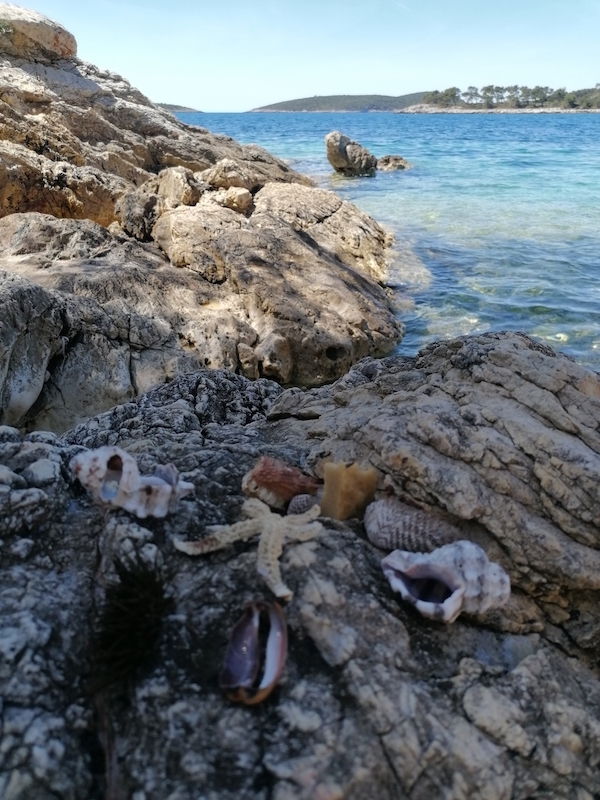
However, I still couldn't decide whether to go - to Brac or Solta - for Saturday sunbathing. At the last moment, I blurted out "Solta" at the checkout. "On the first ferry, please!" I totally forgot that the first ferry is at 6:40 am. "Nevermind, I'll go to sleep earlier today!" Then I recognised this ticket purchase was a fundamentally wrong decision. That Friday we celebrated Sveti Duje, the day of the saint patron of Split. There was no chance for me to escape the celebration and go to sleep earlier.
A suddenly emerged thought saved me from the desire to throw the ferry ticket into the sea from the pier where we celebrated Split City Day in the middle of an incredible post-covid standard crowd until 2:00 am. I thought that I could sleep on the beach of Maslinica on Solta. After 3.5 hours of sleep at home, I packed up and ran to the ferry.
5. Sometimes it is helpful to talk to a homeless man.
Solta is the closest island to Split. By ferry, one way takes only one hour. Once I'd settled on the ferry, I fell asleep. Thank you to the kind Croatian woman next to me who woke me up! At the port of Rogac I checked Google maps - 2 hours walk to Maslinica. 20 minutes later I reached one of the three 'towns' of Solta where you can find a supermarket.
Entering the supermarket I noticed a very colorful homeless man on the bench in front of it. He looked like Ali Baba. Red down jacket, harem pants, white apron, blue hoodie tied around the neck instead of a scarf. Fingerless gloves. A black beret holding a tuft of long gray hair and a gray beard. I had to restrain myself from taking a picture of him. I was not going to sponsor his vodka.
I had to restrain myself, but failed at the checkout. Too good a type! He was standing on the other side of the glass door while he noticed me taking a picture of him. He was waiting for me at the exit. "Take an initiative talking with locals. Don't be afraid!" I calmed myself. "Please, sir, may I take a picture of you?"
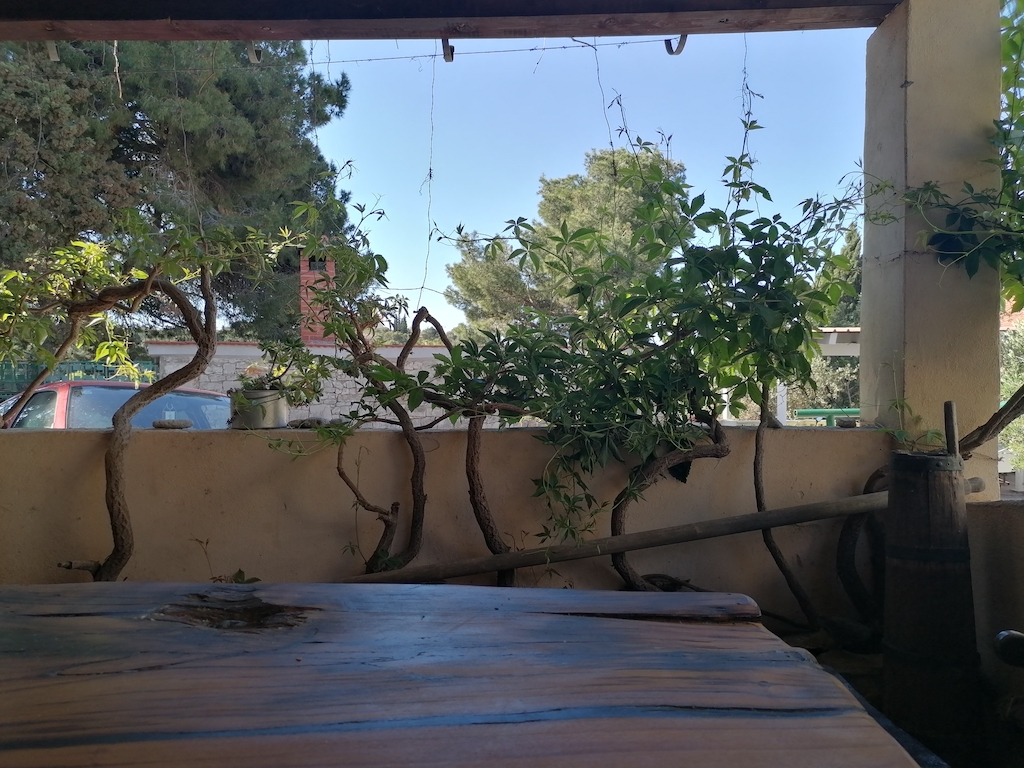
On the fifth attempt, the homeless man guessed that I was from Russia. Novorossiysk (Russian port) - Izmail (today's Ukraine) - Gori (Georgia). That's in general how his path in USSR looked like. His work had something to do with the sea as I understood. "I had a great company in the Crimea," he said. "I still remember those five Russian women surrounding me: Lyuba, Zoya, Nina..." It seems to be true, in those days the names were popular in the Soviet Union. The man was in Poland as well, in the Czech Republic. He worked in France for six months, then in the United States...
He remembered a few sentences in Russian. Here on the island, there were some Russian girls in Necujem. He taught them three main phrases in Croatian:
- Mi se svije Hrvatska. (I like Croatia).
- Ja ću se udati za Dalmatinca. (I will marry a Dalmatian man).
- Ja sam dobra pička. (I'm a good p***y).
Well, I can trace some logical connection here...
6. Have a list of souvenirs from Solta.
Homeless Ali Baba asked me how long would I stay in Croatia. He began to think about what souvenirs should I send to my family in Russia. Solta olive oil, Solta honey, Solta wine, Rogac bean for baking, lavender...
"I will collect it for the next time you come to Solta. I have oil, wine, a farm, 7 chickens, 2 houses... You can sleep in one of them, and I'll stay in the other. Is it okay? Take some lavender I picked this morning. Here you are. Do you know that there are two types of lavender? Do you want a chocolate bar?"
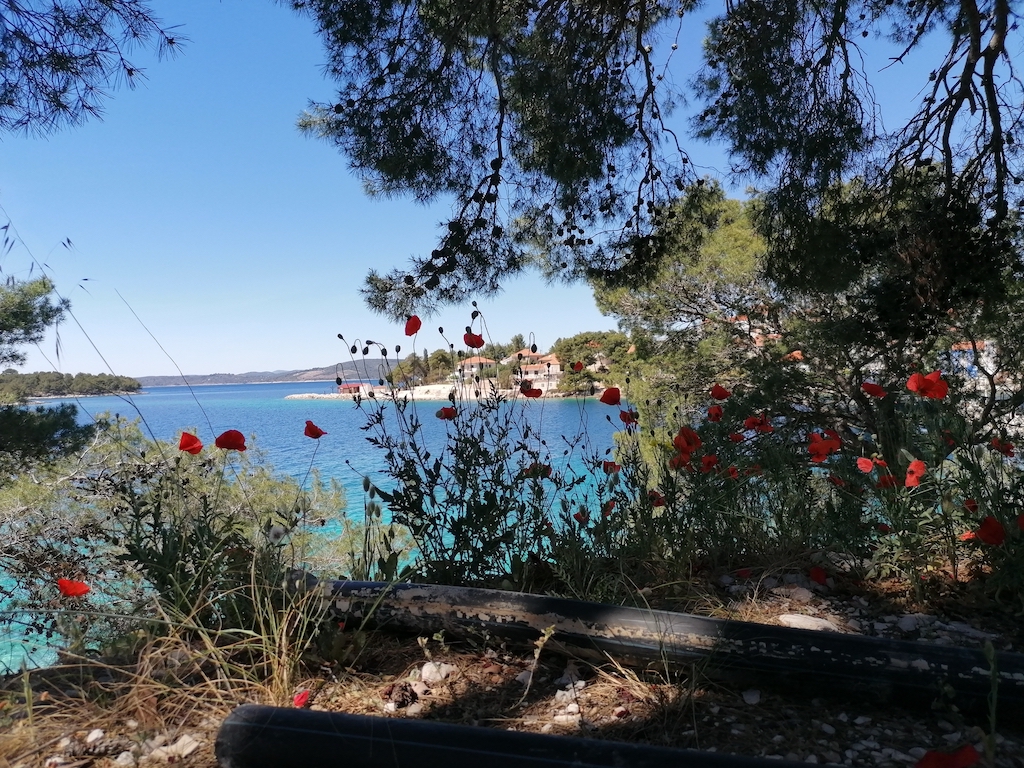
I jumped aside as Ali Baba touched me with lavender. Flowers do not excuse the whole stench. And the worst thing was his long nails. I was at a loss. Some parts of his story seemed plausible. However, I could not find any logical connection between his own farm and the homeless look. Two houses? I'm not going to believe in it.
The situation that we were standing in the center of the town nearby the only supermarket seemed even stranger. People passed us by us every five minutes. They greeted Ali, in response he defiantly showed me to everyone. "Look, such a beautiful Russian is talking to me!" Passersby looked at me with a grain of compassion, but they passed by further. Then one of the passers-by had heard that I was on my way to Maslinica and offered to give me a ride. He was going in the same direction. Thank you, Igore! I quickly got in the car.
Recap
1. Clothes do not make the man.
In the end, I got to Maslinica in 15 minutes by car, not in 2 hours by foot. On the way, Igor explained to me that Marin Kumin (that's the true name of 'Ali Baba') was not homeless. He does have things he mentioned. He's not a foolish man. Unfortunately, he went crazy in the sea about two years ago. Since then he has not been washing, shaving, cutting his hair. It looks scary from the outside. But he's not what he seems to be.
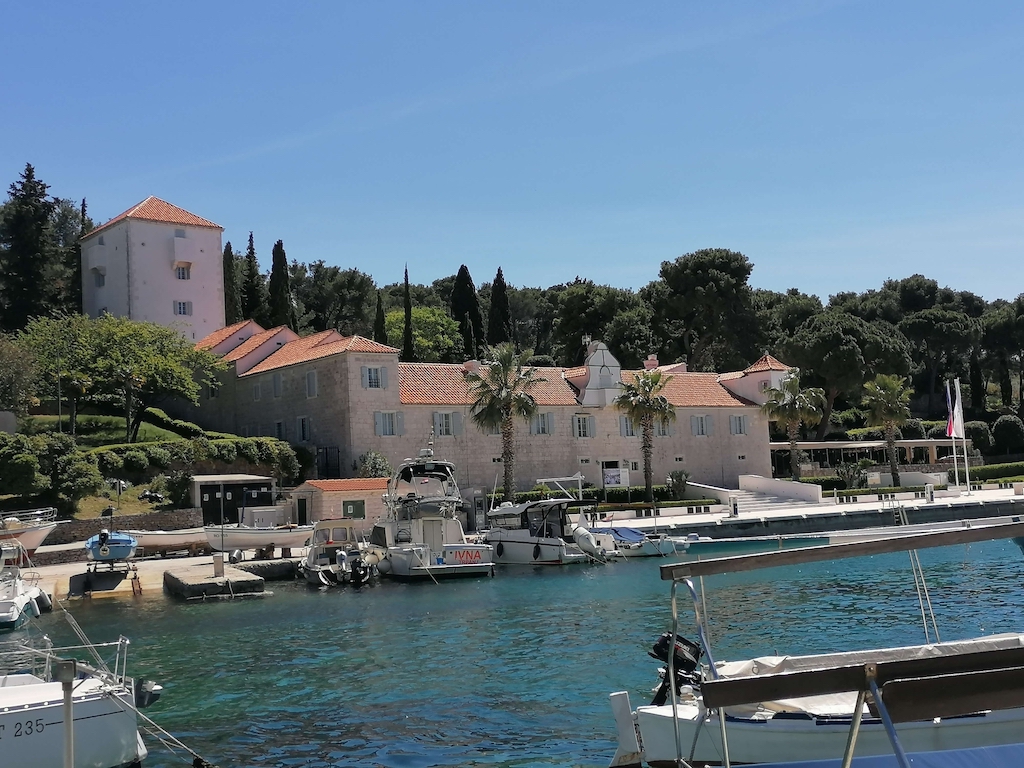
2. Take the initiative to talk to locals on the island.
I would probably consider the breakfast that Igor fed me after we came to Maslinica - coffee and toast with Solta honey - as a part of traditional Dalmatian hospitality. But the best lunch I've had in Dalmatia would never happen if I had left his place in a rush, without any conversation. I asked about a fishery on the island - I had lunch with Igor and his friends-fishermen. We ate the tuna they caught the day before. I had only known about tuna from canned food and Hemingway's story 'The Old Man and the Sea'. My concepts were turned upside down. Eventually, I found an island where there's more fish than meat.
3. Don't be afraid to go around the island alone.
Igor showed me the Maslinica neighborhood, Martinis-Marchi castle, and a way to a beach. Then I went alone to an empty rocky beach. I swam also alone, although there were some yachts around. No fear. I was a little worried that nobody will notice if I drown. But as I got out the beach marine officers asked me about the temperature of the water and how I felt.
4. If something goes wrong, you can always sleep on the beach.
It was my first swimming this year. The water at the beginning of May was still cold. I swam for five minutes. Never mind, then I slept on the beach. And then I swam two more times.
5. Sometimes it is helpful to talk to a homeless man.
I mean a keen conversation, lavender and the fresh tuna I had!
6. Have a list of souvenirs from Solta.
Try to do it in advance, because when you come outside the tourist season, it's complicated to get the souvenirs immediately. I didn't succeed to take a bottle of Solta olive oil on the same day, so I had to go back again.
For more on travel in Croatia, follow TCN's dedicated page.
Together for a Cleaner Ugljan Project Has 300,000 HRK Approved
April the 26th, 2021 - The "Together for a cleaner Ugljan" (Zajedno za cisci otok Ugljan) project, which will focus much of its attention on maritime heritage, has had funds in the amount of 300,000 kuna approved for its work.
As Morski writes, the purpose of the "Together for a cleaner Ugljan" project is the promotion and valorisation of fishing and the maritime culture/heritage of Ugljan and the surrounding areas, as well as the extension of the tourist season through the holding of events related to fishing, aquaculture and ecology, writes the Nasi skolji portal.
These are events which include lectures on environmental protection, round tables for local fishermen, underwater/beach clean up actions and more, all with the promotion of local fishery products and fishing and maritime traditions at their heart. The project also includes the mapping and marking out of diving locations and analysis of the state of the seabed, along with education on ways to prevent underwater pollution and preserve the marine environment. In addition, the project will produce publications on the promotion of local products as a healthy way of eating, as well as interpretive educational boards related to diving sites and the upgrading of the Adventure Island mobile application (app).
''The value of this project stands at 299,286.58 kuna, and we've been approved funds in the amount of one hundred percent. This is a joint project of the Municipality of Preko, the Tourist Board of the Municipality of Preko and the Tourist Board of Ugljan, while TZO Preko is the official applicant and project holder in the administrative sense. All project activities will be carried out together in all places and on the islands in the Municipality of Preko. This is another in a series of our positively evaluated projects which involved public calls/invitations and tenders, and we're extremely proud of the high pass rate, ie the approval and positive decisions in regard to all of our projects. This is proof that we're doing our job well, that we have professional and capable people, but also the significant support of all of the relevant ministries, the Government and Zadar County, with whose cooperation we're implementing all our projects out there in the field,'' stated Jure Brizic.
He also pointed out that the ''Together for a cleaner Ugljan'' project is one that will certainly contribute to the evaluation and promotion of the area's natural, cultural and maritime heritage, raise awareness of preserving the marine environment, fishing and maritime traditions and heritage and popularise local fisheries and the consumption of fish products.
''The ''Together for a cleaner Ugljan'' project is fully in line with today's trends in tourism in which the main motives are returning to nature, preserving the environment, staying outdoors, returning to our roots, preserving traditions and more, therefore we have no doubt about its successful implementation and the acceptance of its users - locals, guests and other visitors alike,'' said Ivan Kosta, the director of TZO Preko.
For more on the many Croatian islands dotted along the coastline, make sure to bookmark our dedicated section.
How is Croatian Island Energy Transition Process Going?
March the 30th, 2021 - When it comes to Croatia's beautiful islands, things tend to look more idyllic than they are. With islander complaints rife and comparisons between the mainland almost constant, the Croatian island energy transition process is an important topic.
As Poslovni Dnevnik/Ivan Tominac writes, the initial phase of the EU Island Clean Energy Secretariat has proved successful. A number of new energy projects and activities have been launched, in which the Croatian association Pokret otoka (Island movement) has also been active. Given the effectiveness of this kind of network, the European Commission (EC) has launched the second phase of the work of the Secretariat for Clean Energy of the EU islands.
They continue to cooperate with Pokret otoka as a regional partner that will represent and support the Croatian island energy transition over the next two years. For the aforementioned phase, in the spring of 2021, a call for projects will be announced for which the island's stakeholders will apply with their various project proposals, and the added value they will receive will come in the form of professional technical assistance.
Workshops have been announced that aim to engage island communities to act at the local level and take on a coordinating role in numerous Croatian island energy transition projects. Among other things, the Islands Think Tank will gather from all levels of government - a group whose task is to discuss both the legal and regulatory barriers to the transition to clean energy on the islands.
Support in this work consists of finding sources of funding and shaping future projects, and for those islands that are only at the very beginning in terms of wider community engagement, professional support is available for community building and defining different transition strategies.
Valid and timely support has proven to be the path to self-sustainability of island communities, and Pokret otoka has always believed in this. It is an association that brings together all lovers of islands and all of the country's many islands, with the desire to achieve the necessary social change.
Changes at all levels
It is indisputable that the aforementioned association is doing an excellent job in terms of this desire, as evidenced by the cooperation with the Secretariat for Clean Energy of the European Islands. The collaboration they have started over the past two years has triggered a number of activities and positive changes on several islands. The focus was primarily placed on developing strategies for the Croatian island energy transition, and it was in this manner that they bravely stepped out onto the path to a more sustainable and green future in general. Their praiseworthy example alone encouraged many other people to think more deeply about further development.
"By working together, we launched projects on Korcula, Hvar, Brac and the Cres-Lošinj archipelago and we encouraged cooperation at all levels of the government. It's especially important for us that we're able to connect and strengthen local stakeholders and initiate changes from the bottom up,'' said the president of Pokret otoka, Maja Jurisic.
Continued positive changes seem to be happening along that route, but support has always been and will remain a much-needed ingredient. Owing to that, back in February this year, they signed a new two-year contract with the Secretariat for Islands established at the European Commission at the initiative of Croatian MEP Tonino Picula.
“The goal of this cooperation is to continue the started activities and realise the goals from the strategies, as well as to encourage other island communities on their paths to clean energy. Over the next couple of years, in cooperation with our partners from Europe, training sessions will be organised, professional and technical support will be provided to transition teams located on the islands, we'll take part in mapping legislative frameworks and in the proposal of measures to encourage energy project development and the Green Plan policy.
We're witnessing big changes at all levels, including a shift towards green policies and concrete sustainable development. Therefore, we believe that the community of islanders and island stakeholders, who will be involved in this Croatian island energy transition, will be further increased and strengthened, and that we'll all learn and develop together with other islands and islanders across Europe,'' added Jurisic.
Bringing change isn't always an easy task, however, as they pointed out from Pokret otoka, the perspective needs to be changed in order to achieve those much needed alterations. Therefore, when asked about obstacles, they say they prefer to call them challenges.
If we go back in time, few people took the Croatian island energy transition and the path towards more sustainable development seriously, these topics were spoken of by a few politicians only, and the whole transition was carried on the backs of green activists for many years. At this point, this is no longer the case, and issues surrounding the green transition have become part of our daily lives.
“The biggest challenges are always people and the inevitable change of habits that we all have to implement in our lives and thus indirectly in the communities in which we live. Additionally, one of the biggest challenges was to articulate the needs and attitudes of the islanders and to understand the proper functioning of various systems and ways of making strategies, plans, programmes and decisions that directly affect the lives of islanders.
I often say when we're asked what the role of Pokret otoka is that we're actually translators of the island needs into the language of state bodies and vice versa. Real knowledge of the community requires coexistence and understanding of the specifics that aren't lacking on the islands,'' she added.
Of course, another challenge is tourism, too. Seasonality and excessive oscillations of people on the islands affect the overall transition and implementation of the strategy, as do a lack of professional staff and long-term development planning.
However, despite all of the above, Pokret otoka refuses to give up. Instead, it establishes regular and constructive communication with public authorities, participates in working groups for the development of strategies and plans for the country's islands and establishes strategic partnerships with organisations that have relevant experts on the topics they deal with.
Rome wasn't built in a day...
"I think the Croatian island energy transition we're working on will take time. In order not to lose motivation, it's important to set goals on an annual and even monthly basis. Then the ultimate goal seems much more achievable to you because ultimately, the goal stops mattering, but the path we're walking along does,'' said Jurisic.
For all current information about coronavirus specific to Croatia, including travel and border rules, as well as testing centres across the country, bookmark this page.
Novalja Business Incubator Open - First Such Facility on Croatian Island
March the 29th, 2021 - When it comes to differences between the Croatian mainland and its many inhabited islands, one could write a book. From unreliable ferry connections disappointing island residents to a lack of proper infrastructure, the list is long. However, the Novalja business incubator, the very first one on a Croatian island, is now open, marking a significant shift when it comes to island life.
Novalja has always been known for tourism and strong bura winds. In pre-pandemic times, Pag as an island was visited by countless tourists on an annual basis. Lovers of partying and of this island's strange moonlike landscape have come to know this island well, but just like with the majority of other Croatian islands, stoking business hasn't really been a strong point unless it involves revenue from bars and beaches. That could all be about to alter.
As Poslovni Dnevnik writes, Pag could be pushed up yet another level, and one which doesn't necessarily have to involve tourism, with the opening of the brand new Novalja business incubator, the first of its kind on an island in this country, reports Zimo.
The director of the new Novalja business incubator, Dinko Skunca, referred back to Pag's famous bura winds and stated that of all winds the island experiences throughout the year, this, the wind of strength, will certainly be the most significant yet.
With the opening of the Novalja business incubator, one of Novalja's doggedly determined entrepreneurs also got a spring put back in her step.
''Miracles will happen here,'' said entrepreneur Nikolina Persola Dabo, adding that her tracksuits for both girls and boys with the Pag ''signature'' on them might not have ever even seen the light of day if the incubator hadn't opened on Pag.
''For the first six months, I don't have to pay anything - which is wonderful, I'll be able to invest that money into buying other business items and raw materials,'' she stated.
For more, follow our business section. For current coronavirus information specific to Croatia, including border and travel rules, as well as testing centres across the country, bookmark this page.
Croatian Island Register Published! All Islands in One Place
February the 28th, 2021 - The definitive Croatian island register has finally been created, listing all of Croatia's many islands and islets and all of the interesting facts they boast - all in one place.
As Morski writes, as announced at the Croatian Government session held a few days ago, the Ministry of Regional Development and European Union Funds, based on the Islands Act and the Ordinance on the methodology of establishing and maintaining the Croatian island register, created the definitive document.
This document records all 1,244 islands, islets and reefs in the Republic of Croatia in one place. All of them are classified according to their specific external characteristics, features and other parameters important for their management, use and the preservation of a unique island geographical unit.
The aim of the Croatian island register is data and cartographic recording of all of the country's islands and islets that are an integral part of the territory of the Republic of Croatia, creating databases for the islands that will serve as a basis for analytical reports necessary for further guidance and policy when it comes to island development.
The Croatian island register has been set up at the address of the Shared Services Centre and is designed to be, in the long run, an integrated information system of island indicators with connections to the offered web services of more than 30 public bodies across Croatia that hold data on islands within their respective competence.
The Croatian island register, at least in version 1.0, boasts basic, geographical and demographic data, data on territorial jurisdiction as well as data on the development index, traffic connections and data from the competence of the Ministry of Health.
You can access the new Croatian island register by clicking here.
For the latest travel info, bookmark our main travel info article, which is updated daily.
Read the Croatian Travel Update in your language - now available in 24 languages.
Krk Companies are Strongest Registered Enterprises on Croatian Islands
February the 24th, 2021 - Krk companies are the strongest of all enterprises registered as being headquartered on Croatia's many islands, with impressive revenues to boast of.
As Poslovni Dnevnik/Ana Blaskovic writes, Krk companies enjoyed an amazing 12.1 billion kuna in revenue back in pre-pandemic 2019, a tenth of the total revenue generated by the tourism sector that record year.
When compared to back in 2018, the income of Croatian enterprises operating in various municipalities, towns and cities of Croatia's many inhabited islands increased by a fifth in just one single year, according to the analysis of the Financial Agency (Fina).
The strongest island enterprise registered currently in Croatia is GP Krk with a massive 686.5 million kuna in revenue, followed by Trgovina Krk with 428 million kuna and Jadranka hotels with 299.7 million kuna in revenue.
The analysis of financial statements included 4954 Croatian island enterprises registered across 51 cities and municipalities. They employed 23,977 employees in total, equal to 7.1 percent more than were employed back in 2018. When it comes to total export revenue from such companies, as much as 1.7 billion kuna was calculated.
Unsurprisingly, the most numerous of these island-based enterprises operate in the activities of providing accommodation and food preparation and serving, of which 1108 were analysed, and together they generated 3.2 billion kuna, 26.5 percent of the total revenues of companies based on Croatia's islands.
Unsurprisingly again, tourism activities are also the largest employers: they employ 7,378 workers, which is 30.8 percent of the total number of employees working for island-registered companies. This is followed by trade with 682 companies and 2,874 employees enjoying 2.4 billion kuna in revenue, and construction with 564 companies, 3,195 employees and 1.8 billion kuna in revenue.
For the latest travel info, bookmark our main travel info article, which is updated daily.
Read the Croatian Travel Update in your language - now available in 24 languages.
Croatian Islanders Voice Anger at Alleged Croatian Post Discrimination
February the 21st, 2021 - Croatian islanders have voiced their irritation at alleged discrimination from Croatian Post (Hrvatska posta) as certain types of mail continue to fail to reach them owing to an odd decision made by Croatian Post.
Croatian Post is often the butt of the joke when it comes to talking about snail mail, mail which simply never arrives or postmen claiming they've knocked at your door when they quite honestly haven't, but for Croatian islanders, issues with the Croatian postal system have been seriously raised.
As Morski writes, Croatian islanders, more specifically the annoyed residents of the island of Premuda are far from happy with the performance of Croatian Post, which, as they say, has been preventing them from receiving any packages heavier than 2 kilograms since mid-February. Letters warning of discrimination against Croatian islanders were sent to the various addresses of Croatian Post, but also to the Ministry of Maritime Affairs, Transport and Infrastructure.
''As of Friday, February the 12th, 2021, the residents of the island of Premuda are no longer able to order supplies through the web store of Croatian Post, Yellow Click, if the package weighs more than 2 kilograms. Through their website, it's possible to order only through the HP Express service, which is disabled for the islands of Premuda, Silba, Olib, Molat, Ist… Throughout the past year, Croatian islanders have used this service mostly for potatoes, apples and the like because the agricultural season was bad, and a pandemic ensued.
We have a great internet connection, the web store is booming, and the only option for those of us who live on the islands is being abolished? This is Croatian Post, 100 percent owned by the state. The islands have a post office like we have shipping lines, and we can't just let this issue go so easily. Does the state intend to abolish the post office as their next step, too? Another job removed from the island? Disable Croatian islanders the use of a postal service throughout the year, on every working day? These letters are being sent by the residents of Premuda to the authorities, feel free to download them and ask for a statement,'' warned Lea Grdovic.
In the letter they sent to Croatian Post and the Ministry of Maritime Affairs, it says:
''To whom it may concern, we're addressing you because of the decision of Croatian Post not to deliver packages to some islands, including the island of Premuda. The island is connected to the mainland by ferry three times a week. The journey takes several hours, and the inhabitants of the island are mostly elderly people and it isn't easy for them to travel to Zadar. Package shipments are even more important to Croatian islanders during these pandemic-dominated times, because they're often the only way for people to get certain things from the mainland and from abroad.
The decision of Croatian Post discriminates against the inhabitants of the islands in relation to other inhabitants of Croatia. They cannot choose between other delivery services, but are dependent exclusively on Croatian Post. The country's postal services are under your jurisdiction and should be available to all residents of this country, so please allow the residents of Premuda to receive and send packages that mean everything to them,'' said the locals of the island of Premuda in their joint letter.
For the latest travel info, bookmark our main travel info article, which is updated daily.
Read the Croatian Travel Update in your language - now available in 24 languages.
Circular Economy on Islands Lags Due to Low Environmental Awareness
February 17, 2021 – In a video podcast entitled "Energy Transition on the Islands," organized by the Island Movement initiative, participants warned that underdeveloped environmental awareness is one of the main obstacles to implementing the circular economy on islands.
As Hina reports, the deputy mayors of Hvar and Cres warned that citizens are still unaware of the green economy's importance, which makes it challenging to introduce a circular economy on islands.
"The most difficult phase in achieving sustainable development is to explain to ordinary citizens why the energy transition would be a step forward," said Marin Gregorović, deputy mayor of Cres.
The circular economy is a production and consumption model that encourages sharing, borrowing, reuse, repair, recovering, and recycling of products and materials to achieve the product's added value. Such a concept has a positive effect on reducing the amount of waste.
Commenting on the inefficient disposal of waste on the islands, Gregorović noted that "the system is not working well" and that "we have not yet reached the stage of resolving the issue of biowaste disposal."
"Although we have a recycling yard and dual waste management on Cres, and we plan to build a composting plant, the story of the circular economy is still just – a story," said Gregorović.
Kuzman Novak, deputy mayor of Hvar town, added that "the fundamental problem at the national level is waste management."
"We take the garbage bags out of the house, and they are taken away, which we don't see, so we don't think they are our concern anymore. That is the key problem," Novak said, explaining the underdeveloped environmental awareness of citizens.
"When we talk about sustainable development, it's not just about solar power plants and waste management, it's essentially developing an awareness not to be selfish," said Novak.
The new EU Action Plan for the Circular Economy is one of the key elements in achieving climate neutrality, which is a central goal of the European Green Plan. Voting on the new EU circular economy action plan, the European Parliament this month called for additional measures to achieve a carbon-neutral, environmentally sustainable, and fully circular economy by 2050.
To read more about lifestyle in Croatia, follow TCN's dedicated page.
Lastovo is a Hit! Families and Entrepreneurs Want to Live Here
November 16, 2020 – Despite the ongoing coronavirus pandemic, when tourism and business are significantly affected industries, one Croatian island is gaining popularity in both. Lastovo is a hit.
As Slobodna Dalmacija reports, the island of Lastovo is still a corona-free zone, they had a great tourist season this year, and a baby boom. However, as if those were not compelling enough reasons, in the last two months, Lastovo has recorded the interest of several families with children who would like to settle on the island.
And not only families, but on this Dalmatian island, a few hours away from Split by ferry, several entrepreneurs are interested in starting their own business. This story is confirmed to Slobodna Dalmacija by 26-year-old Don Tonći Ante Prizmić whose arrival on the island, in his first parish, coincides with this interesting and unusual phenomenon.
Why do people want to come to Lastovo? Well, the reason is simple. Besides the favorable conditions, the Church on this island continues to lease agricultural land for ten lipas per square meter. The only condition is that you must stay on the island. In the new normal, some see it as a ticket to a better tomorrow.
Because of that, and also because of the church's million square meters of land, the sum of numerous Lastovo fields, and cheap fertile soil – Lastovo is a hit.
"I agree, Lastovo is a hit. And I am so pleasantly surprised that coming to my first parish accompanies me with such good stories," says Don Tonći, continuing with a story about a family from Imotski who first came on vacation on Lastovo, but then fell in love so much that they expressed a desire to move here and engage in agriculture.
"I asked him if he knows how far we are from the mainland and what our ferry lines are. And he said he knows everything, but that they are serious. The only problem is that it is difficult to buy or rent a house on the island due to unresolved property relations. And there are a lot of houses. But they have a solution for that as well. They say they would put a container on the ground first hand. I told them then to come," says don Tonći.
'We wanted to give people a chance'
Other people also called, mostly young families from the area of Kaštela, Split, Dubrovnik, and even from Zagreb. This was followed by several calls from those who would grow lavender, essential plants, produce oils, and open a healthy pharmacy on church land.
Don Tonći opened the door to everyone, happy that on the island from which the youth must move to the mainland to continue their education, the new youth wants to settle. Lastovo, with its 46 green islands and 46 fields, has many church plots where a lot can be grown.
"We are happy that people are calling us and want to come. The price is not commercial because we wanted to allow people to cultivate the land. It began with the blessing of the bishop, and as we now await the new one, we will acquaint him right away with this noble idea. We have vineyards, pastures, fields, forests, all in different sizes. The problem is that they are not in one plot. Some land plots are 20, 50 meters, and more apart. But it is always possible to arrange a lease with one of the owners so that consolidation can be done. This island is beautiful. The truth is, we are a little further from the mainland. To get to Split, you have to get up at three in the morning to catch the ferry. But it has its charms," Don Tonći considers.
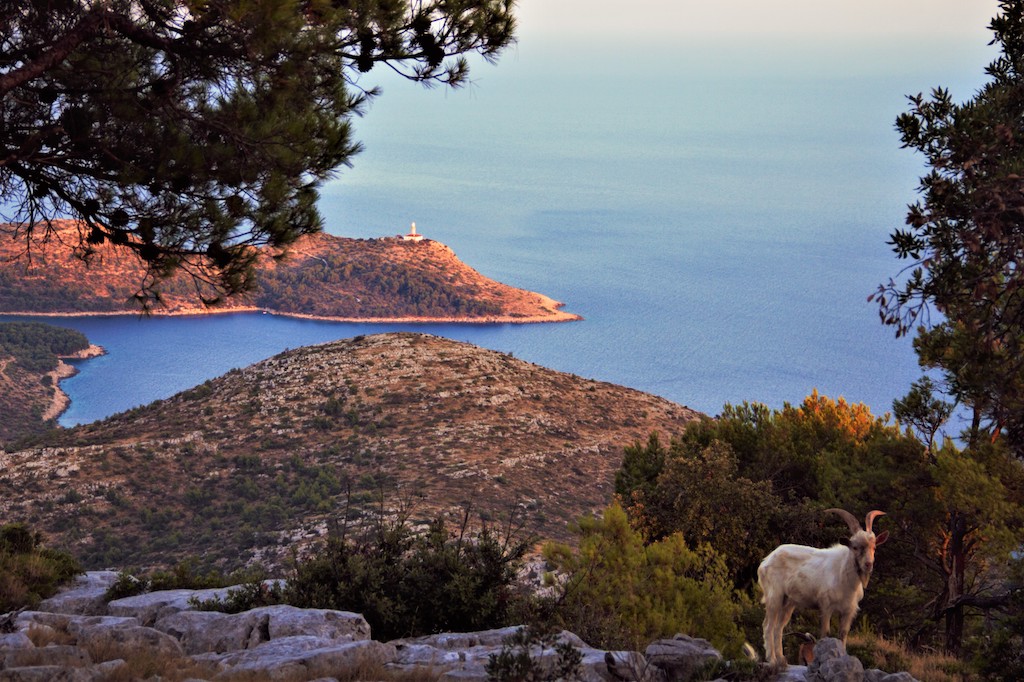
The island of Lastovo / Sara Alduk
Don Tonći is a native of Dubrovnik, and on all of the island, as he jokingly likes to say, he is the only spiritual authority. When he got his first parish, St. Kuzma and Damjan on Lastovo, at first it was a small shock, but he adjusted very quickly. He says that the local people are very open, noble, atypical islanders. They are so strongly attached to each other that an island of 760 inhabitants seems like one big family caring for its members.
"And that's why the interest of those who would like to come here surprised me so pleasantly. I openly showed them what we have – plots of a few hundred to a few thousand square feet, vineyards just waiting for hardworking hands. There are no problems with irrigation either because the dew and nature here do the work themselves. There is a lot of lands, and the locals from Lastovo also rent it. The soil is fertile, soft, well, and gives excellent fruit. We offer you a welcome, so come," says Don Tonći.
Lastovo Statute
Don Stipe Miloš, a former Lastovo priest, explained to Slobodna Dalmacija where the Church got so much land from.
The church land is connected to the Lastovo Statute from the 14th century, according to which each family was obliged to give one-tenth of its annual income to the parish. A third of it went for the needs of the parish, another third as a salary for the pastor. And the third was used for the education of priests. In the 700 years that the Statute has been respected, a lot of lands have accumulated, but also the Lastovo youth has been ordained. And a good part of the estate came through the foundations of fraternities such as Our Lady of the Rosary, the fraternity of St. Anthony, and the fraternity of St. Peter.
To read more about lifestyle in Croatia, follow TCN's dedicated page.
Numerous Croatian Islands Chase Energy Independence in Coming Years
As Morski writes on the 29th of October, 2020, following the first two years of the EU Clean Energy Secretariat's initiative, these Croatian islands form part of a growing community of islands actively working on the energy transition of the European Union.
22 European islands will announce their clean energy transition programmes, thus taking a firm step towards decarbonising their energy systems with a special focus on citizen involvement. An additional 7 EU islands will announce their programs in the near future, reports the Island Movement (Pokret otoka).
A Ilha de Arousa (Spain), the Hvar Archipelago (Croatia), Brac (Croatia), Cape Clear (Ireland), Halki (Greece), Ibiza (Spain), Kasos and Symi (Greece), Korcula (Croatia), Kökar (Finland) ), Menorca (Spain), Pantelleria (Italy), Ouessant, Molène and Île de Sein (France) and Eigg, Muck, Rum, Canna, Fair Isle, Foula and the Knoydart Peninsula (Scotland) have developed a transition plan adapted over the past nine months which also covers their individual needs and resources.
Most of these islands were pioneer islands selected back in February 2019 in a competition by the Secretariat for Clean Energy of the EU Islands, an initiative of the European Commission.
The islands' energy transition strategies have been written by island transition teams themselves, with the support of the Clean Energy Secretariat for EU Islands. A year ago, six pilot island initiatives announced their strategies.
An additional 7 islands currently in the process of final approval that will soon announce their transition plans are: Azores (Portugal), Mallorca (Spain), Marie-Galante (France), Belle-Île, Hoedic and Houat (France) and Crete Greece). They will be available on the website when they are ready.
The official announcement of the strategies will take place during the island's Clean Energy for EU Islands Forum, when decision-makers and representatives of the EU island community come together to discuss the future of the European Islands, EU Islands reports.
''These energy transition strategies are proof of the hard work and productive cooperation among islanders, both within their communities and between countries. It was truly inspiring to see what is possible when local people have the power and support to write their own future. We look forward to continuing to work with the EU's island communities to make the European Green Agreement a reality, both through this initiative and through other EU actions to support local energy transition,'' said European Commissioner for Energy Kadri Simson.
Among these Croatian islands lies the Central Dalmatian island of Brac which wants to become energy independent by 2030 in order to provide its residents and visitors with a healthy environment. It plans to do so by increasing its own energy efficiency, installing renewable energy sources, arranging and improving public transport, and building a waste management centre.
The Hvar archipelago plans to be energy self-sufficient by 2035, and this transition should ensure the proactive involvement of both the islanders and energy communities.
Korcula wants to become carbon neutral by 2050 and become a green island where the community is guided by the principles of caring for people, caring for the environment, and preserving the common good and resources.
For the latest travel info, bookmark our main travel info article, which is updated daily.
Read the Croatian Travel Update in your language - now available in 24 languages


